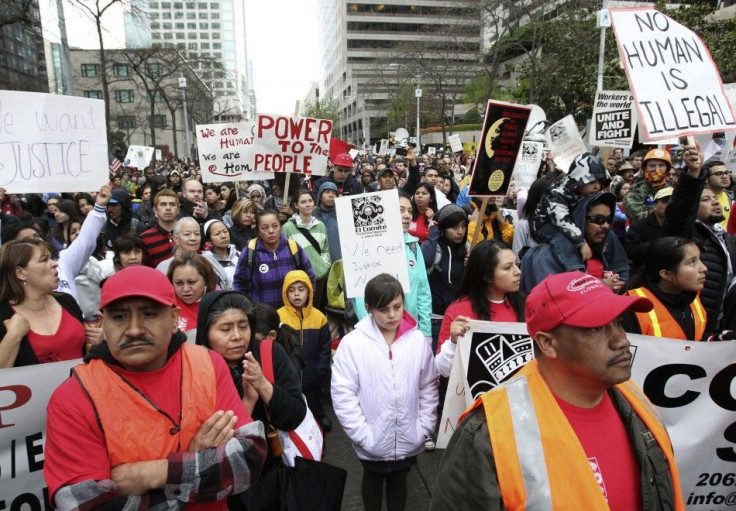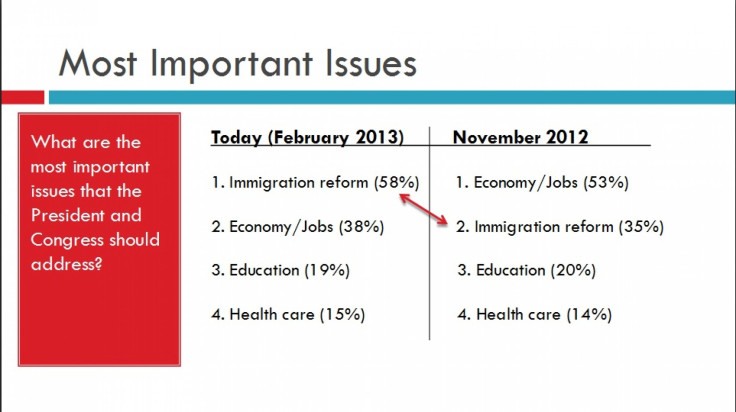Immigration Reform 2013: What’s At Stake? Possibly A Future GOP Presidency

Here’s a number that’s sure to keep Republican strategists up at night: 412. What does it mean? A permanent landslide against the GOP, if Republicans don’t start talking to Latinos.
Projections are showing Latinos fast becoming an ever-larger portion of the voting population. Their top political issue is immigration reform and a path to citizenship for the estimated 11 million undocumented immigrants living illegally in America. What this means is that for any party to maintain its political strength -- especially the Republican Party, whose 2012 presidential nominee talked of "self-deportation" -- its rhetoric and action on immigration reform must be in sync with the thought process of that group.
“Many Latinos know a young person in a situation where they may be deported,” said Michael McDonald, a professor of government and politics at George Mason University in Virginia. “This isn’t an abstract policy. This is something concrete that touches them personally. It makes sense, and if Republicans need to change the views of Latinos, this is the place to start on this.”
Data from Latino Decisions, a polling firm that conducts political opinion research among that group, shows that as of February, 58 percent of Latinos believe immigration reform is the most important issue President Barack Obama and Congress should address. That figure represents a 23 percent increase from last November, when jobs and economy took top priority.
Researchers at Latino Decisions also found that 44 percent of Latino voters will be more likely to vote for Republicans if the party takes the lead in passing comprehensive immigration reform.

Latino voters are already shaping American politics: 71 percent of Latinos helped Obama return to the White House in 2012 after being turned off by Mitt Romney’s “self-deportation” policies. The same voting bloc is also pushing critical swing states like Colorado, Florida and Nevada toward the Democrats.
Many observers believe the impending surge in the Latino electorate could create a siginficant political change.
A report from the progressive think tank Center for American Progress stated that in the near future, states like Arizona and North Carolina (the latter of which Obama carried in 2008 but lost in 2012) will head in the same direction thanks to Latinos, with Georgia and Texas following suit in the long run.
By that organization’s count, if Arizona, Texas, North Carolina and Georgia were to become reliably Democratic, the 332 electoral votes Obama secured last year could increase to 412 -- and the GOP would be doomed.
“Whether these states flip from red to blue is an open question,” the center’s report read. “But two things are abundantly clear: In each of these states, voters of color, particularly Latino voters, are becoming an ever-larger share of the total voting population. These voters care deeply about how both parties talk about immigration, and use it as a litmus test for how candidates from either party feel about their communities as a whole.”

The bipartisan “gang of eight” lawmakers working on an immigration reform bill they hope will pass in 2013 could submit its legislation this week, with the Senate Judiciary Committee taking it up on Friday.
It will be the first comprehensive immigration reform policies in nearly 30 years. The legislation is expected to provide a path to citizenship, boost border security and create easier access for skilled workers.
“I think having a regular flow of worker benefits everybody, workers and employers,” said Michael A. Olivas, professor of immigration law at the University of Houston. “Allowing these people to come out of the shadows benefits them and taxpayers. Everybody has a stake in it, but I don’t believe there is a bad side [to immigration reform].”
Olivas said he has never been more confident that something good will come of the issue and urged lawmakers to act quickly and to be fair and generous.
“It certainly can’t be worse than the status quo,” Olivas said of the forthcoming bill.
The immigration law professor said both Republicans and Democrats have a lot to gain from immigration reform. However, if securing election votes is a driving factor, the power of those votes won’t be seen for a long time because of the time frame the law proposes it should take immigrants to become citizens, .
“If they think it’s going to make a bunch of Democrats, it won’t happen for a number of years,” he said. “Both sides will have to work hard to capture the support of these people.”
Nevertheless, McDonald said there is an opportunity here for Republicans, who are currently undergoing a makeover to attract more minorities.
“There’s an incentive for Republicans to get ahead of this now,” McDonald said, adding that he is skeptical of what’s going to happen in the House of Representatives if the immigration reform bill clears the Senate. The House is also working on its own immigration plan.
“The Senate is the first hurdle,” he said. “The dynamics of how the districts are drawn, there is little incentive for the House to get into this. I am not [as] optimistic as others looking at what’s happening in the Senate. There will be much more opposition in the House.”
© Copyright IBTimes 2024. All rights reserved.






















